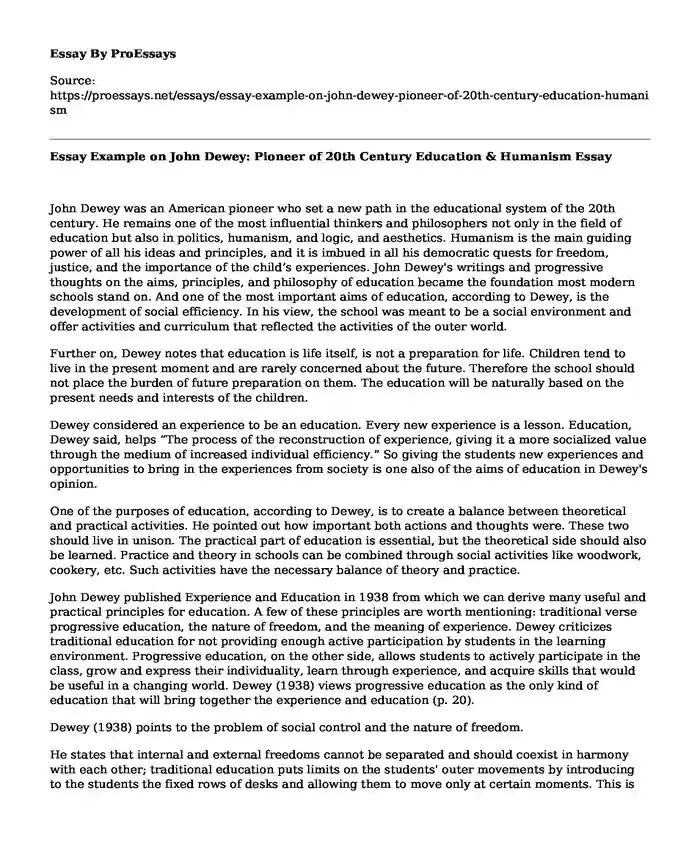John Dewey was an American pioneer who set a new path in the educational system of the 20th century. He remains one of the most influential thinkers and philosophers not only in the field of education but also in politics, humanism, and logic, and aesthetics. Humanism is the main guiding power of all his ideas and principles, and it is imbued in all his democratic quests for freedom, justice, and the importance of the child’s experiences. John Dewey's writings and progressive thoughts on the aims, principles, and philosophy of education became the foundation most modern schools stand on. And one of the most important aims of education, according to Dewey, is the development of social efficiency. In his view, the school was meant to be a social environment and offer activities and curriculum that reflected the activities of the outer world.
Further on, Dewey notes that education is life itself, is not a preparation for life. Children tend to live in the present moment and are rarely concerned about the future. Therefore the school should not place the burden of future preparation on them. The education will be naturally based on the present needs and interests of the children.
Dewey considered an experience to be an education. Every new experience is a lesson. Education, Dewey said, helps “The process of the reconstruction of experience, giving it a more socialized value through the medium of increased individual efficiency.” So giving the students new experiences and opportunities to bring in the experiences from society is one also of the aims of education in Dewey's opinion.
One of the purposes of education, according to Dewey, is to create a balance between theoretical and practical activities. He pointed out how important both actions and thoughts were. These two should live in unison. The practical part of education is essential, but the theoretical side should also be learned. Practice and theory in schools can be combined through social activities like woodwork, cookery, etc. Such activities have the necessary balance of theory and practice.
John Dewey published Experience and Education in 1938 from which we can derive many useful and practical principles for education. A few of these principles are worth mentioning: traditional verse progressive education, the nature of freedom, and the meaning of experience. Dewey criticizes traditional education for not providing enough active participation by students in the learning environment. Progressive education, on the other side, allows students to actively participate in the class, grow and express their individuality, learn through experience, and acquire skills that would be useful in a changing world. Dewey (1938) views progressive education as the only kind of education that will bring together the experience and education (p. 20).
Dewey (1938) points to the problem of social control and the nature of freedom.
He states that internal and external freedoms cannot be separated and should coexist in harmony with each other; traditional education puts limits on the students' outer movements by introducing to the students the fixed rows of desks and allowing them to move only at certain moments. This is an improvement upon the intellectual and moral freedom. This artificial uniformity does not allow the students to express their individuality and stay physically and mentally healthy. In Dewey's opinion, freedom in all of its forms is an integral part of the educational process. Dewey (1938) mentions the importance of experience in education again. He strongly believes that education must be based upon and must consist of individuals' actual life experiences; without this, education will not accomplish its tasks. All the theories and all the scientific data in education are there for students and individuals to expand their experiences and gain valuable life knowledge and practical skills.
Conclusion
John Dewey influenced all the major educational systems in the world, an IB education not being an exception. An IB education offers a broad-minded and globally-oriented education that combines both practical and theoretical means of attaining knowledge, and this surely goes hand in hand with the principles of Dewey, who also advocated the importance of experience in education, freedom of movement both internally and externally.
The IB education has a concept of inquiry-based instruction that uses the natural curiosity of students toward the world to enable them to learn the academic subjects. Dewey (The Child and the Curriculum, 1902) shares this same principle of connecting experiences of the outer world and the theories in education. The principles of the IB education and those of John Dewey are mostly in alignment with each other, and both call for the best in the students and the teachers, and allow the freedom of self-expression.
References
Dewey, J. (1934). Art as experience. New York: Capricorn Books
Dewey, J. (1938). Experience and Education. Toronto: Collier-MacMillan Canada Ltd.
Cite this page
Essay Example on John Dewey: Pioneer of 20th Century Education & Humanism. (2023, Sep 11). Retrieved from https://proessays.net/essays/essay-example-on-john-dewey-pioneer-of-20th-century-education-humanism
If you are the original author of this essay and no longer wish to have it published on the ProEssays website, please click below to request its removal:
- Industry Engagement Research Project
- Failing Entrance Exam Essay
- Technology Resistance, Incompatibility, and Unpreparedness of Teachers Essay
- Instruction and Delivery Strategies in Teaching Paper Example
- School Engagement Among LGBTQ High School Students Paper Example
- Essay Sample on Antebellum: Abolitionists vs Slavery Supporters
- Essay Sample on Alexander the Great: Conquering the World with Martial Leadership







